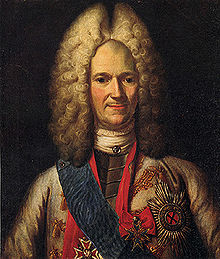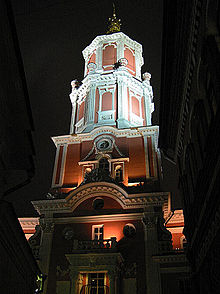- Aleksandr Danilovich Menshikov
-
Aleksandr Danilovich Menshikov
Александр Данилович Меньшиков
Generalissimo of Russian Imperial Army In office
1727–1728Preceded by Aleksei Shein Succeeded by Duke Anthony Ulrich of Brunswick Admiral of Russian Imperial Navy In office
1726–1728Preceded by Thomas Gordon Succeeded by Martin Gossler Member of Supreme Privy Council In office
1726–1728Preceded by Position established Succeeded by Vasily Lukich Dolgorukov 1st President of College of War In office
1717–1724Preceded by Position established Succeeded by Anikita Repnin Member of Governing Senate In office
1711–1728Preceded by Position established Field Marshal of Russian Imperial Army In office
1709–1728Preceded by Boris Sheremetev Succeeded by Anikita Repnin 1st Governor-General of St. Petersburg In office
1702–1724Preceded by Position established Succeeded by Pyotr Apraksin Personal details Born 6 November 1673
Moscow, Tsardom of RussiaDied 12 November 1729 (aged 56)
Berezov, Russian EmpireSpouse(s) Darya Mikhailovna Arsenyeva Religion Russian Orthodox Military service Allegiance Tsardom of Russia
Russian EmpireService/branch Russian Imperial Army
Russian Imperial NavyYears of service 1699–1728 Rank Generalissimo Battles/wars Battle of Kalisz
Battle of Holowczyn
Battle of Lesnaya
Battle of Poltava
Surrender at PerevolochnaAwards Titles
Prince of Russian Empire
Prince of the Holy Roman Empire
1st Duke of Ingria
1st Duke of Cosel
Orders
Order of St. Andrew
Order of St. Alexander Nevsky
Order of the Black Eagle
Order of the White Eagle
Order of the ElephantAleksandr Danilovich Menshikov (Russian: Алекса́ндр Дани́лович Ме́ншиков) (16 November [O.S. 6 November] 1673, Moscow – 23 November [O.S. 12 November] 1729, Berezov) was a Russian statesman, whose official titles included Generalissimus, Prince of the Russian Empire and Duke of Izhora (Duke of Ingria), Prince of the Holy Roman Empire, Duke of Cosel. A highly appreciated associate and friend of Tsar Peter the Great, he was the de facto ruler of Russia for two years.
Contents
Early life
Menshikov was born on 16 November [O.S. 6 November] 1673 in Moscow. It has been disputed by his enemies whether his father was a stablehand or worked on a barge; it's more likely that he was of petty noble stock. As the story goes, he was making a living on the streets of Moscow as a vendor of stuffed buns known as pirozhki[1] at the age of twenty. His fine appearance and witty character caught the attention of Franz Lefort, Peter's first favorite, who took him into his service and finally transferred him to the tsar. On the death of Lefort in 1699, Menshikov succeeded him as Peter's prime favorite and confidant.
He took an active part in the Azov campaigns (1695–1696) against the Ottoman Empire. During the tsar's first foreign tour in the next year, Menshikov worked by his side in the dockyard of Amsterdam, and acquired a thorough knowledge of shipbuilding and colloquial Dutch and German. He acted as subordinate to Boris Sheremetev, who was commander-in-chief during the retreat before Charles XII in 1708, subsequently participating in the battle of Holowczyn, the reduction of Mazepa, and the crowning victory of Poltava (8 July [O.S. 27 June] 1709), where he won his field-marshal's baton.
Corruption
From 1709 to 1714 he served during the Courland, Holstein and Pomeranian campaigns, but then, as governor-general of Ingria, with almost unlimited powers, was entrusted with a leading part in the civil administration. Menshikov understood perfectly the principles on which Peter's reforms were conducted and was the right hand of the tsar in all his gigantic undertakings. But he abused his powerful position, and his corrupt practices frequently brought him to the verge of ruin. Every time the tsar returned to Russia he received fresh accusations of plunder against "his Serene Highness."
Peter's first serious outburst of indignation (March 1711) was due to the prince's looting in Poland. On his return to Russia in 1712, Peter discovered that Menshikov had turned a blind eye to wholesale corruption in his own governor-generalship. Peter warned him "for the last time" to change his ways. Yet, in 1713, he was implicated in the famous Solov'ey process, in the course of which it was demonstrated that he had defrauded the government of 100,000 roubles. He only owed his life on this occasion to a sudden illness. On his recovery Peter's fondness for his friend overcame his sense of justice.
In the last year of Peter's reign new allegations of fraud by Menshikov came to light, and he was obliged to appeal for protection to the empress Catherine. It was chiefly through the efforts of Menshikov and his colleague Tolstoi that, on the death of Peter, in 1725, Catherine was raised to the throne. Menshikov was committed to the Petrine system, and he recognized that, if that system were to continue, Catherine was, at that particular time, the only possible candidate. Her name was a watchword for the progressive faction. The placing of her on the throne meant a final victory over ancient prejudices, a vindication of the new ideas of progress, and not least security for Menshikov and his ill-gotten fortune.
Supremacy and disgrace
During Catherine's short reign (February 1725 – May 1727), Menshikov was practically the absolute ruler of Russia. He promoted himself to the unprecedented rank of Generalissimus, and was the only Russian to bear a ducal title. Upon finishing the construction of the Menshikov Palace on the Neva Embankment in St Petersburg (now assigned to the Hermitage Museum), Menshikov intended to make Oranienbaum a capital of his ephemeral duchy. Pushkin in one of his poems alluded to Menshikov as "half-tsar".
On the whole he ruled well, his difficult position serving as some restraint upon his natural inclinations. He contrived to prolong his power after Catherine's death by means of a forged will and a coup d'état. While his colleague Peter Tolstoi would have raised Elizabeth Petrovna to the throne, Menshikov set up the youthful Peter II, son of the tsarevich Alexei, with himself as dictator during the prince's minority.
He now aimed at establishing himself definitely by marrying his daughter Mary to Peter II. But the old nobility, represented by the Dolgorukovs and the Galitzines, united to overthrow him, and he was deprived of all his dignities and offices and expelled from the capital (20 September [O.S. 9 September] 1727). Subsequently he was deprived of his enormous wealth, stripped of the titles, and he and his whole family were banished to Berezov in Siberia, where he died on 23 November [O.S. 12 November] 1729.
In Beryozovo Menshikov (with his own hands!) built a wooden church. He buried his daughter who died in exile there.
Palaces of Menshikov
-
Menshikov Palace, St. Petersburg
See also
Aleksandr Sergeevich Menshikov – his great grandson.
 This article incorporates text from a publication now in the public domain: Chisholm, Hugh, ed (1911). Encyclopædia Britannica (11th ed.). Cambridge University Press.
This article incorporates text from a publication now in the public domain: Chisholm, Hugh, ed (1911). Encyclopædia Britannica (11th ed.). Cambridge University Press.References
- ^ Anne Volokh. The Art of Russian Cuisine. Collier Books, New York, 1983. p.289
External links
Categories:- 1673 births
- 1729 deaths
- Russian nobility
- Field Marshals of Russia
- Generalissimos
- Recipients of the Order of the White Eagle (Poland)
- Recipients of the Order of St. Andrew
- People from Moscow
Wikimedia Foundation. 2010.




